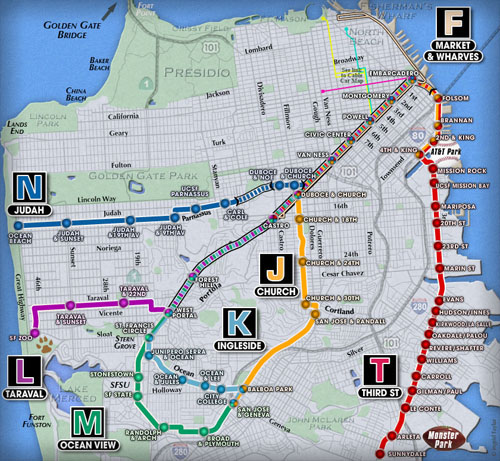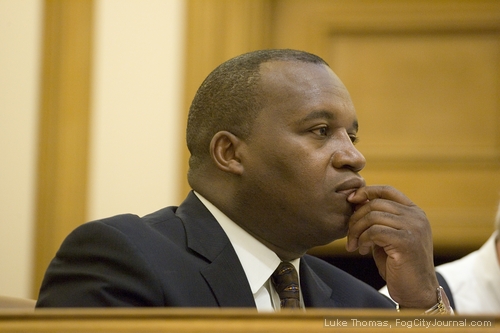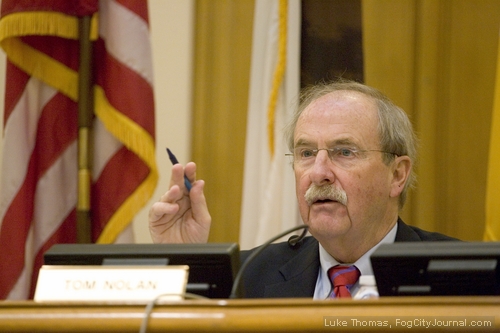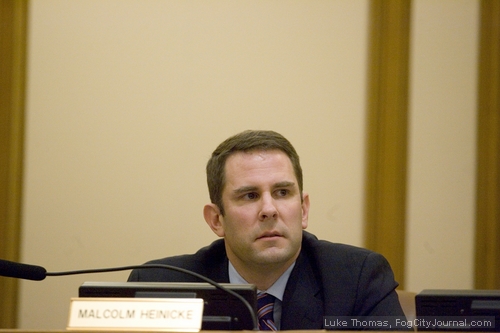
By Sue Vaughan
February 28, 2010
San Francisco Chronicle columnist C.W. Nevius jumped onto the “blame the drivers for Muni’s woes” bandwagon, Thursday, writing, “Riders have already seen fare hikes and service cuts and they may face them again thanks to Muni operators who rejected a proposal for a package of concessions that would have saved the agency $15 million over two years.”
Thanks to Muni operators?
Muni drivers have incredibly hard jobs. They sit in the same position for hours and take all kinds of abuse from the public. They deserve to be paid well. At the same time, they are not completely blameless. Perhaps the work rules do need to be tightened up, but the general public should be clear: changing operator work rules will bring back some money to the agency – but $15 million is not enough.
The San Francisco Municipal Transportation Agency (SFMTA) is facing a 14.2 percent combined shortfall in its $772.8 annual budget, $12.1 million in the current fiscal year and a projected $97.7 million in the next two fiscal years (FY 2011-12). Â The reasons for the deficit can be broken down into some rather broad categories that include:
Capitalism Run Amok and Americans Maxing Out on Natural Resources Credit Cards
Few question that after three Milton Friedmanesque decades of little-to-no regulation of the financial industry, and after 60, 70, 80, or more decades of living on a hydrocarbon high, the Great Recession repo man is at the door. And yet, we are up against vested interests and lifestyles that are hard to change.
Freeway Fondness, Lobbyists, and Capital Projects
Our system of national highways, which moves over 200 million vehicles in the US, is the largest public works project in the history of the world, with 70 percent of the funding coming from user fees and tolls (primarily the 18 cent per gallon gas tax) and the rest coming from bonds, property taxes and other revenue-generating measures. In an age of dwindling liquid fuels, global climate change, and global war, there is a question about the sustainability of this transportation system.
Nonetheless, according to the Center for Public Integrity, transportation lobbyists spent over $45 million during the first half of 2009 in efforts to influence the shape of federal transportation bills. Perhaps as a result, highway projects received the bulk of the $51.2 million dedicated to transportation in last year’s $787 billion stimulus bill – the American Reinvestment and Recovery Act (ARRA) – $27.5 billion. In the Bay Area alone, the fourth bore of the Caldecott Tunnel (which now carries 160,000 vehicles daily) was one of the largest recipients of the ARRA nationally: $197.5 million. The replacement of Doyle Drive with the controversial Presidio Parkway – estimated to cost $1.045 billion – got $168 million.
Only $100 million of the stimulus was made available to public transportation systems – and all that was supposed to be spent on capital projects, not day-to-day operations (although, due to imploding urban transit systems, a small percentage has been released for operations).
Other gigantic capital projects are also getting huge infusions of federal and/or regional and local money. They include the $4.2 billion Transbay Terminal and the $2 billion Central Subway. Local activists are concerned the Central Subway in particular will undermine the ability of Muni to pay for its more mundane bus and light rail operations.
There are signs that President Barack Obama is trying to redirect transportation funding in his recent $3.8 billion FY 2011 budget proposal. He has dedicated $6.7 billon of that proposal to transportation. One billion dollars is for high speed rail ($1 billion out of a $5 billion annual investment on top of the $8 billion in the stimulus) and another $527 million has been set aside for the creation of sustainable communities through a joint project of the US Department of Transportation, the US Environmental Protection Agency, and the US Department of Housing and Urban Development.
We can only hope that some of that money will go into public transportation operations, as Smart Growth America has produced a study showing that by investing in public transportation you get a two-for-one bang for your buck in terms of jobs creation and retention, but …
At the State Level Our Hummer Driving Governor …
… has yanked the State Transit Assistance (STA) funding, $3.5 billion in state gas tax money dedicated to transportation. For the SFMTA that has amounted to a loss of $179 million over three years, according to Executive Director Nat Ford, at the Tuesday, February 23 meeting of the San Francisco County Transportation Authority. Recall that the SFMTA budget used to be over $800 million annually – so the $60 million annual loss from the STA is significant.

SFMTA Executive Director Nathaniel Ford.
Additionally, Arnold Schwarzenegger originally ran for governor during the 2003 recall partly on a platform of repealing the state car tax, or vehicle license fee (VLF). He did that almost immediately after being elected. But in October 2009 he signed SB 83, allowing municipalities to put measures on their local ballots to collect $10 VLFs. If such a measure gets put on the November San Francisco ballot and it passes, it will raise around $5 million to help pay for transportation-related projects.
Unfortunately, the governor and state lawmakers are now considering eliminating the state sales tax on gasoline and replacing it with an excise tax. State gasoline taxes are in part dedicated to transit. Excise taxes have no mandates.
On top of our national penchant for capital projects and our Grover-Norquistian governor, there is …
An Absence of Political Will at the Local Level
According to the 1999 charter amendment, Proposition E, the seven members of the SFMTA Board of Directors – all mayoral appointees – are mandated to seek new sources of revenue and are empowered to put revenue-raising measures on the ballot. But they never have.
In addition, last year, when the agency faced a $128.9 million deficit, they voted to declare a fiscal emergency in order to waive a California Environmental Quality Act review of proposed service cuts and fare hikes – but then they amended their budget at the last minute to eliminate a proposal to expand the hours of parking meter operation (which is projected to raise $9 million annually) and replace it with a 90-day study.
That study is now complete — showing that pedestrians and transit riders spend more money per month in purchases than do drivers, and that in North Beach and the Marina, 85 percent of customers arrive on foot, by taxis or on transit, and that in West Portal 59 percent of customers arrive on foot — but expanded hours of parking meter operation remain merely a ‘ghost’ proposal.
And yet, the seven directors — a fairly anonymous unelected lot — must be hearing rumors about proposed charter amendments for the November ballot that would distribute the power of appointment to the board away from the mayor. Different ideas are floating around, and they include distributing appointment power to the Board of Supervisors, the Board of Education, the City College trustees, the Commission on Aging, the Mayor, and/or the Mayor’s Commission on Disability. And one former president of the SF Board of Supervisors, who shall remain nameless, recently made the tongue-in-cheek suggestion to distribute the power like this: three from the mayor, two from the Board of Supervisors, and two from the commissioners for the San Francisco County Transportation Authority.
Perhaps because of the rumors, the current directors have begun to give lip service to expanding the hours of parking meter operation and other measures.
“The Board is clearly moving in the direction of supporting parking meters on Sunday,” said Chairman Tom Nolan at a packed meeting on February 26 to vote on proposed service reductions and other deficit closing measures.

SFMTA Board Chair Tom Nolan.
“I’m disappointed by the vote of the TWU not to accept relatively modest concessions, [but] it’s incumbent that we immediately start implementing a pilot project for extending the hours of parking meter operation to Sunday in four or five business communities,” said Director Malcolm Heinicke.

SFMTA Director Malcolm Heinicke.
Still, when they finally got down to voting on an item to create express route and cable car premium passes that will cost $70 a month, and another item to cut service across the board by 10 percent, both items passed four to three (Ayes: Malcolm Heinicke, Shirley Breyer Black, Bruce Oka, and Tom Nolan; nos: Cameron Beech, Jerry Lee, and James McCray). Not one of the directors proposed amending the budget to expand the hours of parking meter operation.
So are the drivers completely to blame? No, they aren’t.
And I haven’t even gotten to the police and the work orders yet …
On February 26, the SFMTA Board of Directors also voted to eliminate free parking for supervisor aides and commissioners in city-owned garages and to increase the annual cost of a residential parking permit from $76 to $96. But they did not adjourn their meeting. Instead, they recessed the meeting, which will give them an opportunity to revisit their votes when they meet next on Tuesday, March 2 at 12 noon in Room 400, City Hall.


 The Hunger Site
The Hunger Site
March 12, 2010 at 12:06 am
Went to the meeting Thursday (3/11/2010) at the Height Asbury Neighborhood Council and heard some of the ideas of Sue Vaughan. Two that really bugged me – having the city parking meters work on Sunday and not wanting to see the 4th bore of the Caldecott tunnel dug. What is wrong with having one day of peace without parking meters sucking money? Even the Christians have one day of rest on Sunday. It’s Gods day let’s let the parking meters rest. San Francisco does not need to become the city of money grubbing parking meters – if you want to tax drivers institute a $50 per gallon gasoline tax – perhaps that would do a lot for helping to finance MUNI. As for the Caldecott tunnel 4th bore – it should have been done 20 years ago when the 3rd bore was done. If the Federal government needs to spend money to stimulate the economy a tunnel is far more useful that a bridge to nowhere in Alaska or the money that the Obama administration is spending in Iraq ($1 million per year per soldier to basically kill people).
But it did cause me to look up Sue’s writings on the Fog City Journal. Here are some of my comments to this piece.
Muni drivers have incredibly hard jobs. Agree with you on this. Not sure if they are overpaid but they are certainly are underappreciated. Most do an incredible job under difficult circumstances. But there are some that should not be working as drivers – even drivers at the meeting acknowledged this. Whatever happens at MUNI the drivers are key to rebuilding public transit in the city.
Few question that after three Milton Friedmanesque decades … Now Sue should know that this is the propaganda technique of name calling – perhaps she does and is using this propaganda technique consiously . Instead of dealing with the issues she attempts to demonize the entire work of Milton Friedman without any reference to the ideas he exposes. She exposes herself to the criticism of being either a sloppy writer or just plain stupid.
the 18 cent per gallon gas tax – why is the idea of raising the gas tax to 50 cents and using the extra 32 cents for public transit – seems like it could provide a stable source of funds for public transit as well as discoursing the use of private automobiles.
Other gigantic capital projects are also getting huge infusions of federal and/or regional and local money. That is the federal government for you – funding construction projects and not operating expenses. Wonder why this is? Could it possibly because lobbyist write the laws that congress passes? Could it possibly be that both parties – the democrats and republicans benefit from the current system and that there is no motivation for changing it.
March 3, 2010 at 8:56 pm
They will adjust by patronizing businesses within walking distance, and turning their backyards into gardens and buying less and so on …
Things are not going to be the same, and we need to get ready for that.
Trader Joe’s??? It is unlikely to exist.
March 3, 2010 at 12:28 pm
Sue, of course people will adjust. People will adjust by not eating out as much. They’ll adjust by shopping in more places like Trader Joes and Safeway instead of neighborhood businesses (that is until you pass a law taking away free parking at Trader Joes and Safeway). They’ll adjust by moving out of the city. And they’ll adjust by voting against progressive candidates.
But these are not the adjustments I want to see, not when there are so many other less punitive measures available. You can pass across the board progressive tax increases. I do like your VLF idea -it’s much less painful than increasing meter hours. And you can cut salaries for upper management. Nate Ford alone is responsible for 5% of the $8 million deficit, all by his $400,000/yr self!
Pondering this, it sort of ties into the other discussion we’re having, about the sit-lie law. On the one hand, you have a group of people saying that only the most punitive, most extreme measures will be sufficient. And then you have what I think are more sensible forces saying, let’s wait on the extreme stuff and try some of these other things. I don’t mean to call you an extremist, because to your credit (unlike the Sit-Lie crowd) you’re also calling for doing these other things as well. But the idea is the same -let’s try these other things first before we start nailing people to the wall in this lousy economy.
March 2, 2010 at 9:36 pm
Greg, we’ve been living on the hydrocarbon high for decades now, and that is coming to an end. We’re going to be paying more for the things we have come to take for granted — that’s a given. But we are as capable of adjusting and being happy as we are of reacting negatively and destructively to inevitable changes. The choice is ours.
March 2, 2010 at 12:37 pm
Sue, I agree with most of what you’re saying, but I still think the increased meter hours are wrongheaded.
The study is nice, but here’s the thing. Having people pay for parking won’t do a thing to increase customers from foot or MUNI traffic. It will only *decrease* customers from car traffic. If that decrease is only 10% or 15% and not 40% as had been found in Oakland, so what? That’s still detrimental to the local economy.
And while studies of hypotheticals are fine, Oakland’s real world example is something much more salient. Anecdotally, I’ve heard the same thing. A hostess who I spoke with in line at city hall the other day said that her restaurant is completely dead, until 6PM when parking becomes free and then they get a huge rush.
But here’s where it really hurts. If you live there, you basically park your car and forget about it after coming home from work at 6PM. Now you’ll have to pay about $3/hr for 3-6 hours more every evening. That translates to $2340-$4680 per year, not counting Sundays. Smart meter cards alleviate the annoyance factor of having to leave your home and feed the meter, but it does not alleviate the cost issue. And the cost is potentially huge. That’s not a tax that encourages people to drive less. That’s a tax that encourages people to leave the city.
And this arrogant attitude among some anti-car environmentalists is just going to backfire at the polls. I brought up this point to the guy starting up the transit riders union last night. He just said, “Get rid of your car.” Yes, that will really endear your cause to the people of this city.
March 1, 2010 at 3:30 pm
Supervisor David Campos is studying the possibility of a ballot measure to distribute the power of appointment to the Board of Directors. I am not a part of those conversations, but in casual conversation some of us have been discussing alternative appointments. For all I know, there could be one elected member in the final ballot measure — if there is one.
March 1, 2010 at 2:43 pm
The whole city is screwed up. To keep on subject: The MTA ED makes over $300,000 per year to make the buses run on time. He couldn’t so they hired another person to make the buses run on time at either $225,000 or $250,000 . Why does the MTA need both?
I do have a problem with the way the contract is written and think it should be changed to collective bargaining. They need to change the way they calculate overtime and a few other work rules.
In my youth I drove truck mostly in S.F. Driving a bus in this city isn’t an easy job. And, in the big scheme of things, $60,000 isn’t a whole lot of money in the Bay Area.
February 28, 2010 at 3:48 pm
What happened to John Avalos’ proposal to allow the Board to pick 3, the mayor to pick 3, and 1 elected by the public? That scenario seems like it would be a slam dunk.